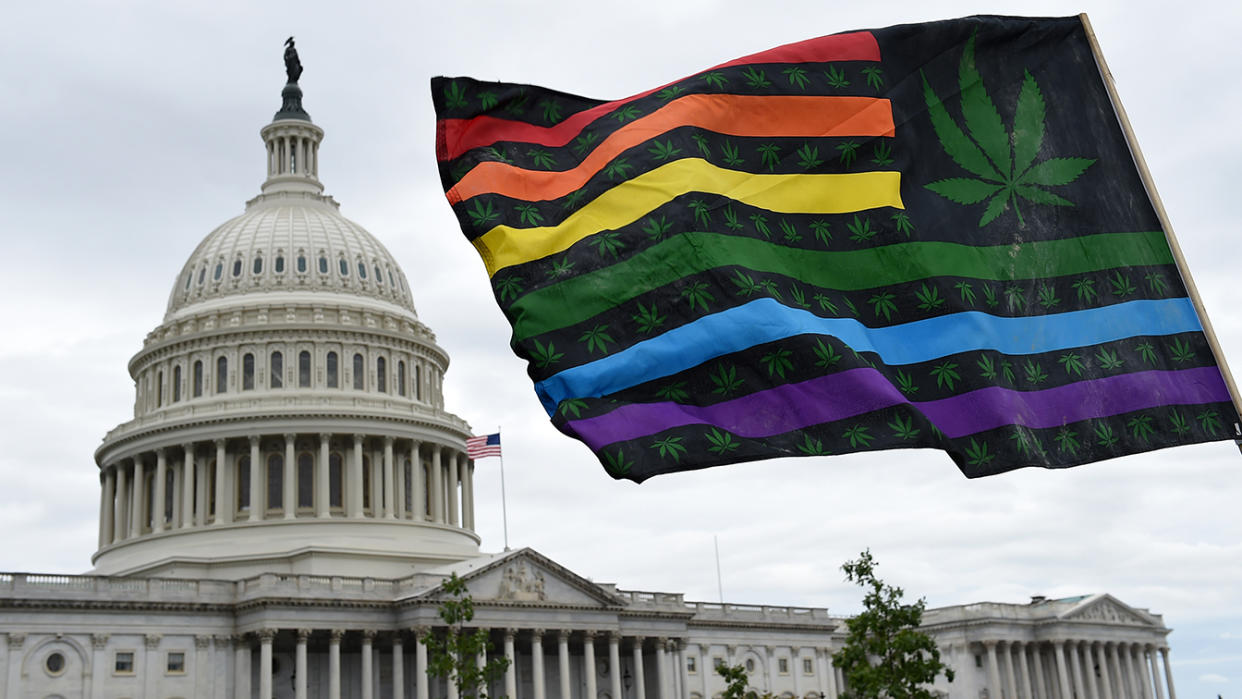Poll finds new high in support for legalized pot

More than two-thirds of Americans support marijuana legalization, according to a new survey from Pew Research, the largest number of people since the organization began polling the question in 2010.
In the poll results released Thursday, legalization was opposed by just 32 percent of respondents, continuing a decade-long decline. A poll taken in 2010 found legalization was opposed by a 52-41 majority. (A Gallup poll of the question in 1969 found 84 percent against.)
Pew added a question to this year’s survey specifically about medical and recreational use. When it was asked that way, 59 percent said they favored legalization for both purposes, and 32 percent approved it for medical use only — and just 8 percent said they were opposed in all cases.
While marijuana remains illegal at the federal level, 11 states and the District of Columbia have already legalized the drug for recreational use. Additionally, 33 states plus the District of Columbia allow it for medical purposes. Marijuana has been illegal since the passage of the Controlled Substances Act of 1970, which classified it as a Schedule I drug, along with LSD and heroin. Pew found a generational divide in its responses, with 64 percent of Americans born in 1945 or before against legalization, while 76 percent of millennials (defined as those born between 1981 and 1997) were in favor.
The recent poll is in line with other surveys. A CBS News poll conducted in April found 65 percent support for legal marijuana use, and Gallup found 66 percent support in 2018. A statewide ballot initiative to legalize marijuana in Michigan, a state that Donald Trump won by 10,704 votes in 2016, passed with 56 percent support in 2018.
Reformers have pointed to the effect of the war on drugs on communities of color as one reason for federal legalization. Black people are 3.73 times more likely than white people to be arrested for simple marijuana possession, and almost 80 percent of federal prisoners serving time for drug offenses are black or Latino. One outcome is disenfranchisement, with one in 13 black people in the country ineligible to vote because of felony records (more than four times the rate for white people). These arrests also have an economic impact that falls disproportionately on minorities.
The social effects of legalization are still a subject of research and dispute. A 2018 Colorado study, released five years after the drug became legal for adults in the state, found no increase in usage by youths but more instances of driving while high. And another state study found that arrests for underage possession were still disproportionately affecting minority youth, who were twice as likely to be arrested as white youths.
Democratic presidential candidates have released a number of policy proposals related to marijuana. Sen. Cory Booker has released a plan that would legalize the drug nationwide, offer clemency to inmates who are imprisoned for nonviolent drug offenses and reinvest in communities targeted by the drug war. Sen. Kamala Harris has proposed a similar policy that would use revenue from a federal tax on marijuana to fund programs to help those who have faced marijuana-related convictions. Sens. Elizabeth Warren and Bernie Sanders have both said that if they were elected president, they would use executive action to effectively legalize cannabis by descheduling it under the Controlled Substances Act.
Last year, President Trump signed into law the First Step Act, a criminal reform bill that among other things reduced mandatory minimum sentences. When asked if he would legalize marijuana at the federal level, he said his administration would continue to let states set their own policy.
“We’re going to see what’s going on. It’s a very big subject, and right now we are allowing states to make that decision,” he said in August. “A lot of states are making that decision, but we’re allowing states to make that decision.”
_____
Download the Yahoo News app to customize your experience.
Read more from Yahoo News:



